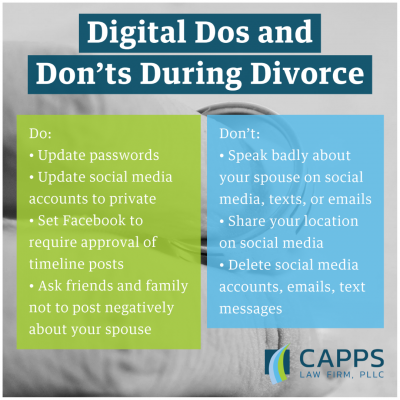Be Careful About Oversharing on Social Media During a Divorce
In this day and age, it has become second nature for many people to share the details of their lives on social media. Whether it’s a post to Instagram or Facebook, a text, or an email, electronic communication is an integral part of modern life. When it comes to social media and divorce, however, caution is advised. If you are in the process of getting divorced, you have to be extremely careful about what you send and post. Even if your messages seem harmless, many people don’t realize that social media can be used as evidence in divorces.
According to the American Academy of Matrimonial Lawyers, over 80% of divorce attorneys surveyed replied that they have seen an exponential increase in the amount of evidence collected and used in divorce cases from social networking outlets in the past five years. This includes evidence collected from a wide range of sources such as texts, emails, call histories, GPS and Internet search histories, social media sites (e.g. Facebook, Instagram), and online dating services (e.g. Bumble, Tinder).

Recent research has revealed how commonly social media is used in divorce proceedings. Some of these statistics might surprise you:
- 81% of all divorce attorneys found social networking information that was later presented in court as evidence
- 66% of divorce lawyers use Facebook as a primary evidence source
- ⅓ of divorce actions begin with affairs that happen online
- Recent studies have found significant Facebook usage to be a cause of conflict in many divorce cases; social media in general is a factor in at least 1 in 7 divorces.
Digital Evidence Used in Divorce Cases
Text Messages
Perhaps the most common type of evidence used in divorce cases is text messages. It’s not uncommon for people involved in a divorce to send texts during times of anger or frustration that are saved and used by their spouse as evidence. These texts can be a potential source of embarrassment and can influence the decisions made in a divorce or custody settlements. This possibility extends to texts sent to children or to friends and family members, not just to your spouse.
Cell phones are another place that attorneys look to for collecting information in a divorce case. By looking at a cell phone bill, your commonly called numbers can be revealed. Cell phones, especially those on a family account, also open up opportunities for tracking a spouse by activating a GPS service on his/her cell phone and recording conversations made on the phone.
Emails
Emails can become a minefield for those navigating a divorce. If an email is sent from a family computer or passwords are saved for convenience on a device that your spouse has access to, those messages could easily be retrieved without your knowledge. There are cookies stored on your computer that show each email and whether you deleted it or not. Also, the servers will have all erased and deleted emails, so even deleted emails are still accessible. You can never be certain of what is stored or archived, so if you do not want to see it in Court, it’s better not to write it.
Social Media
Social media platforms such as Instagram and Facebook have become gold mines for collecting unflattering information used during divorce cases. As a rule, refrain from posting or commenting about your divorce, activities, spending, partying, good times, and bad times. Your comments are memorialized and can be used, misused, or twisted in ways you never expected.
Keep a close eye on what your friends and family are posting on social media. You may be selective about what you include on your social media pages, but that doesn’t mean that your friends are, and they might tag or post pictures of you without your knowledge that could be used by your spouse. It’s important to note that recruiters use social media to help screen job candidates and many bosses check employees’ social media pages – particularly for someone they’ve recently hired.
In recent years, it’s become more common for high school-aged children to have social media accounts as well. While their privacy settings may not always allow you to view their activity, it can be helpful to keep an eye on your child’s posts whenever possible. They may use social media as an outlet to vent frustrations about the divorce or speak publicly about things you would like to keep private.

Some Dos and Don’ts for Social Media and Divorce in the State of Texas
DO
Change all of your passwords
- Change passwords to your phone, email, and social media accounts.
- Make sure to unlink text messages from family accounts, such as a family Apple ID account, so your messages aren’t showing up on linked devices.
Consider creating a new email
- However, do not delete your old accounts and emails
- While you should definitely change your passwords, it may be best to open entirely new email to use moving forward.
- Keep your new account info and stored emails on a computer not used by your spouse and do not share the new account information with them.
Update your social media account settings
- Set your accounts to private and avoid accepting any new followers.
- Change your settings so that you can’t be tagged in a post or photo by another person without your permission.
- Change your Facebook settings so that anything someone wants to post on your timeline is not displayed until you review it. If you don’t like it, you can deny the request.
Ask friends and family not to post about your life
- Critical posts about your ex-spouse or information posted by friends and family about your life can damage your case as well.
- A good rule of thumb is to post, or allow friends to post, only what you would be comfortable with a judge possibly seeing.
Update your social media account settings
- Set your accounts to private and avoid accepting any new followers.
- Change your settings so that you can’t be tagged in a post or photo by another person without your permission.
- Change your Facebook settings so that anything someone wants to post on your timeline is not displayed until you review it. If you don’t like what’s written, you can deny the request.
DON’T
Speak badly about your spouse or ex-spouse on social media, texts, or emails
- Any false comments, threats, or criticisms can lead to harmful results in a divorce.
- Steer clear of posting/texting/emailing anything you wouldn’t want to be used against you in court later.
- Even seemingly harmless posts can be used out of context (passive-aggressive memes and “inspirational” quotes included).
Share your location
- While sharing locations you visit has become a major aspect of social media, it can be damaging to a case, especially to post your location in bars, clubs, casinos, etc.
Delete social media accounts, emails, or text messages
- Per Texas Standing Orders, you should not delete anything after the divorce has been filed, and deleting them can also be seen as an inference of guilt.

Choose an Experienced Attorney to Help Navigate Social Media During Your Divorce
Social media and divorce can be a complicated minefield. Don’t traverse it blindly! Whenever you have questions about what behavior is appropriate when filing for divorce, it’s best to ask an attorney.Kelly J. Capps is an experienced family law attorney who has successfully guided numerous and diverse clients through the potential pitfalls of the divorce process. She can explain the legal aspects of your case and offer tips to help make sure you get a fair settlement. She works hard to find the best path for her clients to move their lives forward.


